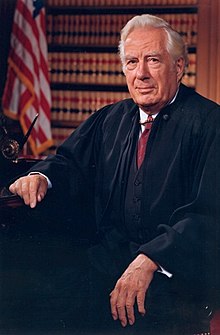Warren E. Burger
Appearance

Warren Earl Burger (September 17, 1907 – June 25, 1995) was Chief Justice of the United States from 1969 to 1986. Although Burger had conservative leanings, the U.S. Supreme Court delivered a variety of transformative and controversial decisions on abortion, capital punishment, religious establishment, and school desegregation during his tenure.
| This article about a political figure is a stub. You can help out with Wikiquote by expanding it! |
Quotes
[edit]1970s
[edit]- No one has ever suggested that tax exemption has converted libraries, art galleries, or hospitals into arms of the state or employees "on the public payroll." There is no genuine nexus between tax exemption and establishment of religion.
- Walz v. Tax Commission, 397 U.S. 664, 675 (1970).
- In my conception of it, the primary role of the Court is to decide cases. From the decision of cases, of course, some changes develop, but to try to create or substantially change civil or criminal procedure, for example, by judicial decision is the worst possible way to do it. The Supreme Court is simply not equipped to do that job properly.
- "Excerpts From Interview With Chief Justice Burger on Role of the Supreme Court", The New York Times (July 4, 1971).
- History is filled with examples of men and women who rendered highly effective performance without the conventional badges of accomplishment in terms of certificates, diplomas, or degrees. Diplomas and tests are useful servants, but Congress has mandated the commonsense proposition that they are not to become masters of reality.
- Writing for the Court, Griggs v. Duke Power Co., 401 U.S. 424, 432 (1971).
- The policeman on the beat or in the patrol car makes more decisions and exercises broader discretion affecting the daily lives of people every day and to a greater extent, in many respects, than a judge will ordinarily exercise in a week.
- Address to local and state police administrators up on their graduation from the FBI, reported in Frank J. Remington, Standards Relating to the Urban Police Function, American Bar Association: Advisory Committee on the Police Function, (1972), p. 2.
- No matter what coercive powers of enforcement governments may assert, the peoples in country after country in all ages have demonstrated that Man was meant to be free but that this ideal can be realized only under the rule of law. And this must be a rule that places restraints on individuals and on governments alike. This is a delicate, a fragile, balance to maintain. It is fragile because it is sustained only by an ideal that requires each person in society, by an exercise of free will, to accept and abide the restraints of a structure of laws.
- Reported in The Episcopalian: Volume 138 (1973), p. 12.
- We are more casual about qualifying the people we allow to act as advocates in the courtroom than we are about licensing electricians. No other profession is as casual or heedless of reality as ours
- Quoted in Newsweek, December 10, 1973, p. 75.
1980s
[edit]- The entire legal profession - lawyers, judges, law teachers - has become so mesmerized with the stimulation of the courtroom contest that we tend to forget that we ought to be healers - healers of conflicts. Doctors, in spite of astronomical medical costs, still retain a high degree of public confidence, because they are perceived as healers. Should lawyers not be healers? Healers, not warriors? Healers, not procurers? Healers, not hired guns?
- Annual address to the America Bar Association winter convention, Las Vegas (February 12, 1984).
- For some disputes, trials will be the only means, but for many claims, trial by adversarial contest must go the way of the ancient trial by battle and blood. Our trials are too costly, too painful, too destructive, too inefficient for a truly civilized people.
- Annual address to the America Bar Association winter convention, Los Vegas (February 12, 1984).
1990s
[edit]- If I were writing the Bill of Rights now there wouldn’t be any such thing as the Second Amendment . . . . This has been the subject of one of the greatest pieces of fraud, I repeat the word fraud, on the American public by special interest groups that I have ever seen in my lifetime.
- Interview (from min 7:49) at MacNeil/Lehrer NewsHour by Charlayne Hunter-Gault, PBS television broadcast (Dec. 16, 1991)


